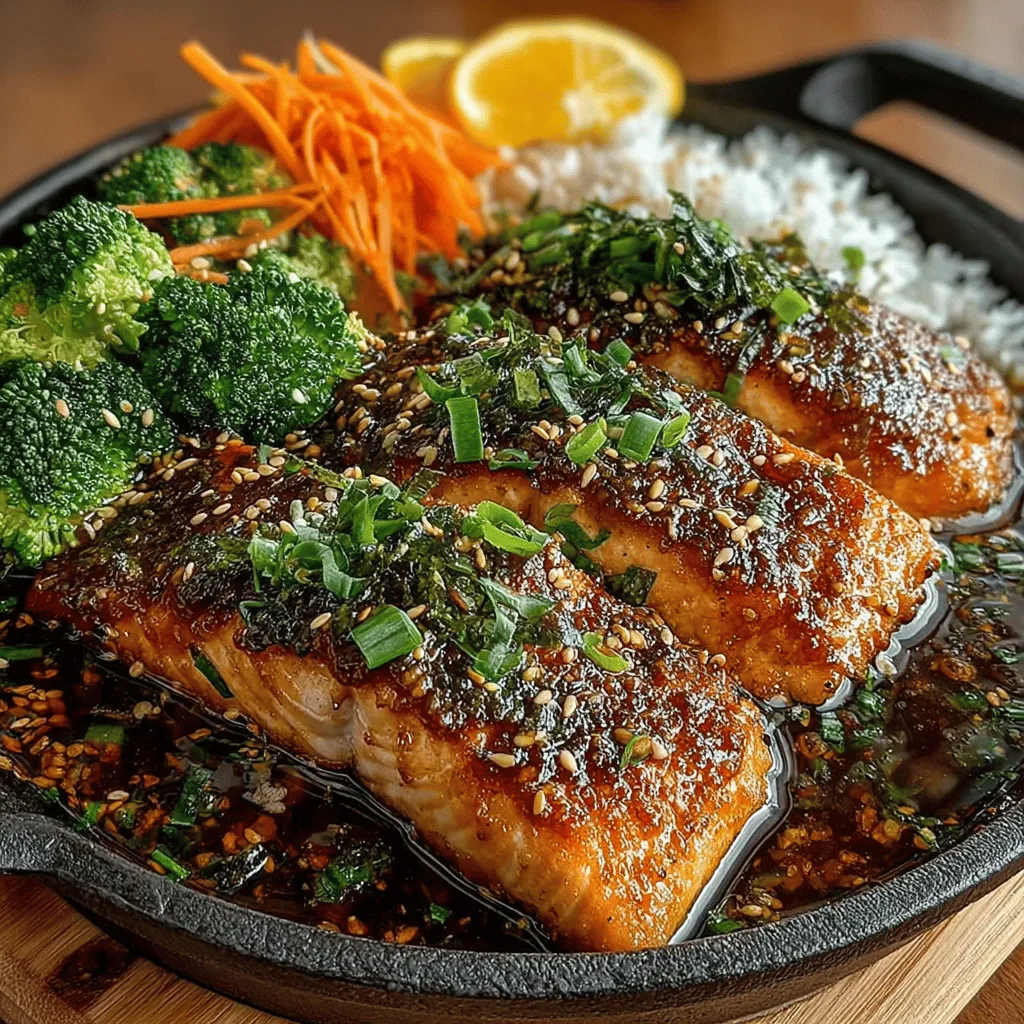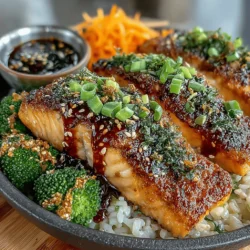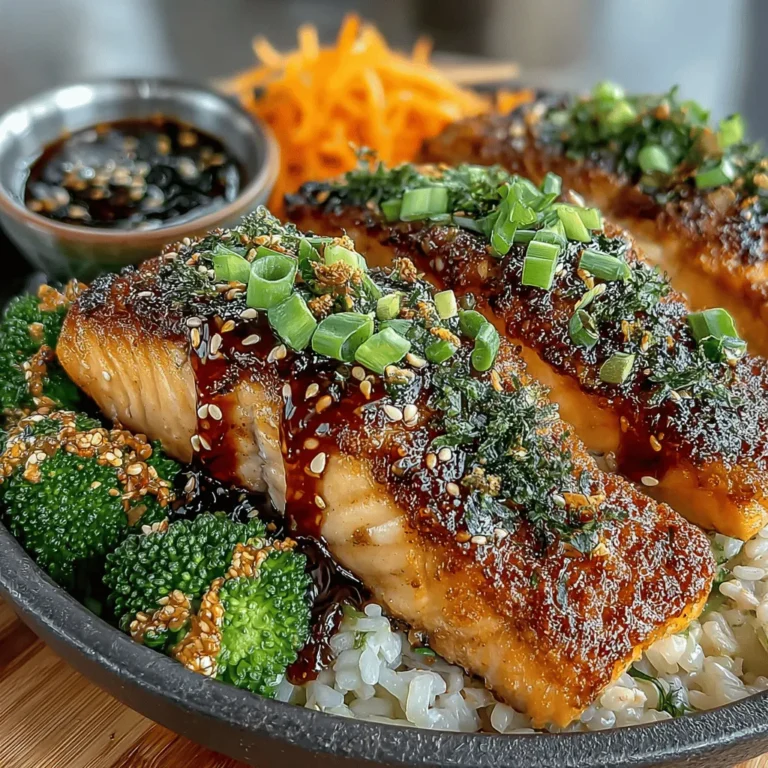Introduction
The Quick Teriyaki Glazed Salmon Rice Bowls offer a delightful blend of flavors and textures, all while being incredibly simple to prepare. This dish is perfect for busy weeknights or a leisurely weekend meal. With its combination of succulent salmon, vibrant vegetables, and a savory teriyaki glaze, it not only satisfies the palate but also nourishes the body. In this article, we will explore the benefits of each ingredient, the preparation process, and even some fascinating cultural insights about teriyaki cuisine.
Ingredients
– 2 salmon fillets (about 6 ounces each)
– 1 cup of teriyaki sauce (store-bought or homemade)
– 2 cups of cooked rice (white, brown, or cauliflower rice)
– 1 cup of steamed broccoli florets
– 1 cup of shredded carrots
– 2 green onions, sliced
– 1 tablespoon of sesame seeds
– Salt and pepper to taste
– Optional: Pickled ginger and nori sheets for garnish
Instructions
1. Begin by cooking the rice according to package instructions. If using cauliflower rice, sauté it in a pan until tender.
2. While the rice is cooking, season the salmon fillets with salt and pepper on both sides.
3. Heat a skillet over medium-high heat and add a drizzle of oil. Once hot, place the salmon fillets skin-side down and sear for about 4-5 minutes.
4. Carefully flip the salmon fillets, then pour the teriyaki sauce over them. Cook for an additional 4-5 minutes, basting with the sauce until the salmon is cooked through and flakes easily with a fork.
5. In the meantime, steam the broccoli florets and prepare the shredded carrots if not pre-prepared.
6. To assemble the rice bowls, place a serving of rice at the bottom of each bowl, followed by the teriyaki salmon, steamed broccoli, and shredded carrots.
7. Garnish with sliced green onions, sesame seeds, and any optional ingredients like pickled ginger or nori sheets.
Understanding the Ingredients
Fresh Salmon: A Nutritional Powerhouse
Fresh salmon is not only a delicious choice for this dish but also a nutritional powerhouse. It is rich in omega-3 fatty acids, which are known for their heart health benefits, as well as high-quality protein and essential vitamins. When selecting salmon, it’s important to consider whether to choose wild-caught or farmed options. Wild-caught salmon is often deemed healthier due to its higher omega-3 content and lower levels of contaminants.
Teriyaki Sauce: The Soul of the Dish
Teriyaki sauce is the soul of this recipe, imparting a unique sweet and savory flavor profile. This sauce has its origins in Japanese cuisine, where it is traditionally used to marinate and glaze grilled meats. While you can find excellent store-bought options, making teriyaki sauce at home allows for customization regarding sweetness and saltiness, providing a fresher taste.
Rice as a Base: White, Brown, or Cauliflower
Rice serves as the comforting base for these bowls. The choice between white, brown, or cauliflower rice can significantly affect the dish’s nutritional value. White rice is more processed, while brown rice offers more fiber and nutrients. For those looking for a low-carb alternative, cauliflower rice is an excellent option, providing a similar texture with fewer calories.
Vegetables: Steamed Broccoli and Shredded Carrots
Incorporating vegetables like steamed broccoli and shredded carrots adds not only color but also essential nutrients to the meal. Broccoli is known for its high vitamin C and fiber content, while carrots are rich in beta-carotene, which is beneficial for eye health. Including a variety of vegetables in your diet is crucial for overall health and wellness.
Garnishes: Green Onions, Sesame Seeds, and More
Garnishes play a significant role in enhancing the flavor and texture of the dish. Sliced green onions and sesame seeds add a crunchy, savory element that complements the salmon and vegetables. Additionally, optional ingredients like pickled ginger and nori sheets can provide extra flavor and a delightful crunch, elevating the overall experience of the rice bowl.
Preparation Steps for Quick Teriyaki Glazed Salmon Rice Bowls
Getting Started: Essential Tools and Equipment
Before you dive into the cooking process, having the right kitchen tools at your disposal can make a significant difference. Essential equipment for this recipe includes a skillet for cooking the salmon, a rice cooker or pot for preparing the rice, and a cutting board for chopping vegetables. Effective prep work, such as measuring ingredients and chopping vegetables beforehand, can also speed up the cooking time and ensure a smooth cooking experience.
Seasoning the Salmon: The First Step to Flavor
The first step in achieving flavorful salmon is proper seasoning. A balanced sprinkle of salt and pepper on both sides enhances the natural flavors of the fish. If you prefer a crispy skin, make sure to start cooking the salmon skin-side down in a hot skillet. This technique not only helps to achieve a perfectly crispy exterior but also retains moisture within the fillet, making for a tender and juicy centerpiece to your rice bowl.

Tips for Perfecting Your Teriyaki Glazed Salmon Rice Bowls
Cooking the Salmon: Mastering the Technique
When preparing your salmon, heat management is crucial. Make sure your skillet is preheated to a medium-high temperature before adding the salmon. This ensures a nice sear and prevents sticking. The cooking times can vary based on the thickness of the salmon fillet; generally, cook for about 4-5 minutes on each side for a standard fillet. Look for the salmon to turn opaque and flake easily with a fork, indicating it has reached the perfect doneness.
Basting with Teriyaki Sauce: Adding Depth of Flavor
Basting your salmon with teriyaki sauce during cooking enhances the flavor and creates a beautiful, glossy finish. Use a brush or spoon to apply the sauce to the salmon in the last few minutes of cooking. This technique allows the sauce to caramelize slightly, intensifying its sweetness and adding a rich, savory depth to the dish.
Assembling the Bowls: Artful Presentation
When it comes to assembling your rice bowls, presentation is key. Start with a base of perfectly cooked rice, then layer your teriyaki glazed salmon on top. Add colorful vegetables such as steamed broccoli, sliced cucumbers, and shredded carrots for visual appeal. Finish with a sprinkle of sesame seeds and chopped green onions for added flavor and texture. Aim for a balance of flavors—sweet, savory, and umami—along with a mix of textures, from the soft salmon to the crunch of fresh vegetables.
Nutritional Analysis of the Dish
Caloric Breakdown: A Healthy Meal Option
Each serving of Quick Teriyaki Glazed Salmon Rice Bowls is approximately 450-500 calories, making it a wholesome choice for a meal. This dish is rich in essential nutrients while remaining relatively low in calories, which is perfect for those who are health-conscious or looking to maintain a balanced diet.
Protein and Fiber Content
Salmon is an excellent source of high-quality protein, which is essential for muscle repair and overall health. Each serving contains around 30 grams of protein, making it a filling option that keeps you satisfied. Pairing the salmon with brown rice and fresh vegetables boosts the fiber content, which aids in digestion and promotes a feeling of fullness. Together, these components create a well-rounded meal that meets dietary needs.
Cultural Insights into Teriyaki Cuisine
The History of Teriyaki
Teriyaki has its roots in traditional Japanese cooking, where the method of grilling or broiling fish and meat, glazed with a soy sauce-based marinade, originated. Over time, teriyaki has evolved, with regional variations emerging across Japan and beyond, each adding unique local flavors and ingredients to the dish.
Teriyaki in Modern Cuisine
In recent years, teriyaki has gained immense popularity in Western cuisine, often appearing in fusion dishes that combine traditional flavors with contemporary cooking styles. From teriyaki burgers to sushi rolls, the sweet and savory notes of teriyaki sauce have made it a beloved ingredient in various culinary creations.
Conclusion
Quick Teriyaki Glazed Salmon Rice Bowls serve not only as a delicious meal but also as a gateway to understanding the flavors and ingredients that define Japanese cuisine. By exploring the nutritional aspects and cultural significance of teriyaki, we gain insight into why this dish has become a beloved choice for many. Whether enjoyed for its taste or its health benefits, this recipe is sure to become a staple in your culinary repertoire.

